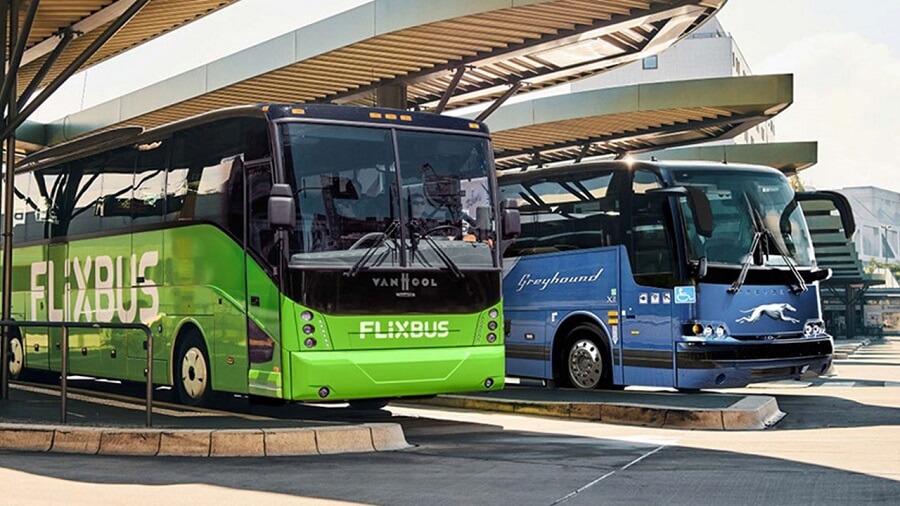Most intercity travelers across Texas—and the rest of the country—are familiar with catching a Greyhound bus as an alternative to flying, carpooling, or driving themselves. Today, the Dallas-based company behind some of the most popular bus routes has a new owner: Munich’s FlixMobility.
The deal brings together a likely match, as FlixMobility operates Europe’s largest long-distance bus network. FlixMobility announced today that it was acquiring Greyhound from its current British owner FirstGroup plc to continue bringing environmentally friendly travel to people across the globe.
The $78 million deal has an enterprise value on a debt-free/cash-free basis of $46 million, plus unconditional deferred consideration of $32 million, according to a news release. Additional sources report that the deal was valued at $172 million.
The iconic running dog continues to roll forward
Greyhound—the largest provider of long-distance bus transportation in the U.S.—serves 2,400 destinations across North America, per its website. That amounts to some 16 million annual passengers.
Most familiar for its iconic running dog logo, the Dallas company prides itself on offering sustainable, affordable travel. In addition to its most well-known city-to-city trips, Greyhound also offers package delivery, connections from rural communities, and interline partnerships. The company was originally founded in 1914.
FlixMobility comes with a cool factor
FlixMobility, a shared mobility provider that operates the FlixBus and FlixTrain brands, plans to use Greyhound’s national presence and more than a century old experience to better serve bus travelers in the U.S.
Founded in 2011, FlixMobility is known in Europe for its innovative tech and unique business model. Part tech startup, part e-commerce platform, part classic transportation company, the mobility provider has changed the way more than 100 million people have traveled across Europe.
FlixBus’ network currently reaches more than 2,500 destinations in 36 countries with 400,000 daily connections—all outside the U.S.
The Greyhound acquisition is a major step forward in building the European company’s presence here, according to FlixMobility Co-Founder and Co-CEO Jochen Engert.
“The continuous expansion of our services through partnerships and acquisitions has always been an integral part of our growth strategy to build our global presence,” Engert said in a statement. “The FlixBus and Greyhound teams share a common vision to make smart, affordable, and sustainable mobility accessible to all.”
FlixMobility is valued at $3B+
Engert started FlixMobility in 2013 with Daniel Krauss and André Schwämmlein in Germany. The goal was to combine technology, e-commerce, convenience, and a commitment to the environment to deliver what they call “a revolutionary means of travel.”
Since then, FlixBus has grown to become Europe’s largest intercity bus network. Sixty-two million people used the service in 2019, according to the company.
FlixMobility started FlixBus USA in 2018 with destinations primarily in the Southwest, like Los Angeles, Las Vegas, and Phoenix. The company has since added more routes in the South, Northeast, and Pacific Northwest.
Exploring electric buses, sustainable alternatives
Also in 2018, FlixMobility launched the first green long-distance trains, along with a pilot program for all-electric buses.
The company hopes to remain on the forefront of sustainable, accessible transportation alternatives, especially as gas and car prices—and climate concerns—continue to rise. The company said its acquisition of Greyhound will further its vision to “offer sustainable and affordable travel to everyone.”
“Consumers across North America are increasingly seeking affordable, comfortable, smart and sustainable mobility solutions,” Schwämmlein said in a statement. “A compelling offering will draw significantly more travelers away from private cars to shared intercity bus mobility. Together, FlixBus and Greyhound will be better able to meet this increased demand.”
According to Schwämmlein, who is also co-CEO, FlixMobility’s growth plan comes at a time when it is continuing to recover from the effects of COVID-19. Earlier this year, FlixMobility closed on a more than $650 million Series G funding round, valuing it at more than $3 billion, per TechCrunch.
Bus lines were essential for many during the pandemic, specifically essential workers. The leadership team at FlixMobility sees the transportation option as driving sustainable growth across the country.
Schwämmlein said the team plans to “replicate the success that we have already achieved in 36 countries outside of the U.S. with our innovative and customer centric approach.”
original content










